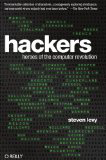Book review - Hackers by Steven Levy
Sat, Mar 26, 2011
Ever since I started programming I have consumed technical books with a passion. From that very first c64 manual, via K&R and Stroustrup through to present day technologies such as Ruby.
But at some point in a programming career you start to look beyond pure ‘how to’ technology books and start to find interest in best practice books such as Code Complete and also computer history books such as Hackers.
Many computer history books tend to start with Microsoft & Apple, Gates, Jobs & Woz, PC & Mac, but Hackers is the first I have read that goes back further to the MIT PDP hackers in the 50s and 60s before moving on to the start of Homebrew, and the hardware hackers in California in the 70s and the early game hackers in the 80s… and it is fascinating!
Hackers is an interesting and highly entertaining description of the characters involved in the computer revolution that took computing out of the hands of the few (mainframe operators) and into the hands of the many (the rest of us):
-
The True Hackers at Cambridge in the 50s and 60s that took over the PDPs at the MIT AI lab late at night when no one else was using it and created ’tools to build tools’ and SpaceWar - the first ever computer game.
-
The Hardware Hackers in California in the 70s that saw the new microprocessor give rise to the possibility of actually owning a computer at home… if you built it yourself!
-
The Game Hackers at Sierra on-line in the 80s that were part of the creation of the computer gaming industry.
-
The Last True Hacker - Richard Stallman and his obsession for software to be free (as in freedom, not beer)
The books focus is squarely on the personalities and beliefs of those with the hacker ethic (using the original meaning of the word hacker). The people involved in these periods are fascinating, while some of the stories are familiar (Homebrew Computer Club, Bill Gates piracy letter, etc.) there are so many little moments that surprised me, like:
-
Hearing that 60s peace activists considered early computer programmers ’the enemy’ because of their links to the military and the early Arpanet. MIT even had to barricade the doors to the AI lab to avoid trouble during anti-war demonstrations in the days of the Weather Underground’s threats to violently overthrow the establishment
-
In 1973, the ‘Community Memory’ project setup a terminal outside a popular San Francisco record store connected to a computer running an electronic message board designed to “allow people to make contact with each other on the basis of mutually expressed interests” - Sounded a lot like a localized craigslist, 20 years earlier!
-
The homebrew computer club had a very very loose definition of the word ‘ownership’. One member was given some chips, took them home, hooked them up and discovered an as-yet-unreleased version of the new Atari game Pong!
While reading this book, its easy to get a little nostalgic for the old days (not that I was there) and these folks creating an industry. But its important to remember that this computer revolution has not finished. With the rise of the internet at the end of the last century, and the explosion in mobile computing happening around us right now there are still plenty of stories yet to tell.
Highly recommended, if you want to learn more computer history beyond Microsoft and Apple this is a great book, with interesting stories about the, sometimes bizarre, personalities involved in the computer revolution.
